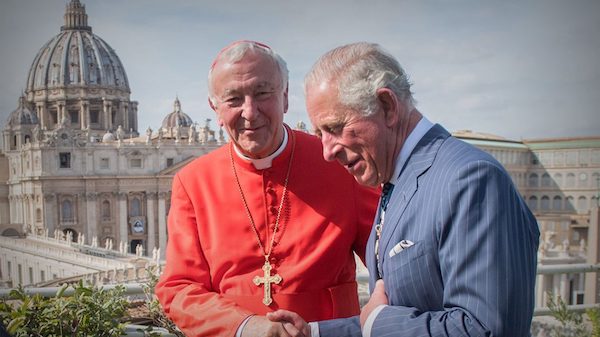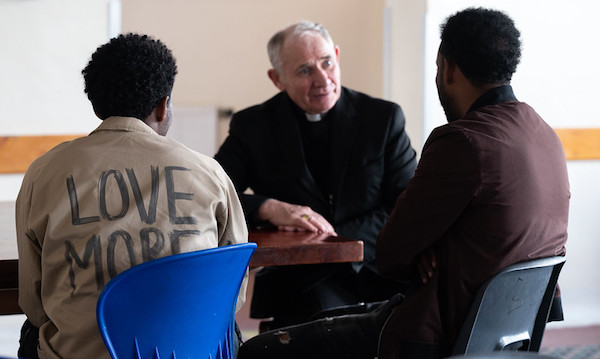The bishops of England and Wales have published a document on the Catholic response to refugees and migrants, days after the bishops’ conference’s lead on the subject criticised the government’s Illegal Migration Bill.
The new document, Love the Stranger, from the conference’s department for international affairs, outlines 24 principles derived from historic Catholic social teaching.
These emphasise the innate worth and rights of each person, and the responsibility of both government and civil society to uphold them.
Migration policy, the document says, must respect these fundamentals, and it calls on the government “to avoid the use of immigration detention, arbitrary expulsion and other practices which violate human dignity”.
This follows the announcement last week by the home secretary, Suella Braverman, of legislation which would render all arrivals via illegal routes – most notably those crossing the Channel in small boats – as automatically inadmissible and subject to detention and removal to a third country.
Bishop Paul McAleenan, an auxiliary in the Archdiocese of Westminster and the conference’s lead for migrants and refugees, said that this treats individuals “as a problem to be solved rather than brothers and sisters towards whom we have responsibilities”.
In a foreword to Love the Stranger, written with the Bishop of Clifton, Declan Lang, Bishop McAleenan describes “our Christian duty to look beyond such labels and see the person who has left their homeland in search of a better life”.
The document details the Church’s teaching on humanity’s common responsibility for one another and on the “universal destination of goods”. Richer nations, it says, cannot enjoy exclusive access to their riches.
“Rather than begin with our own national systems…we are challenged to start with a global approach to upholding human dignity and to work from there.”
As such, “the starting point for public policy should involve respecting a broad right to migrate and restricting it only when demonstrably necessary, rather than beginning with sealed borders and facilitating immigration only when desired.”
The document continues: “Upholding the common good of our society must never be reduced to economic calculations or utilitarian concepts of welfare.”
The bishops advocate stronger protections for the safety of migrants.
“While there may be legitimate debate about the best way for a government to protect those crossing its borders, there is nevertheless a clear responsibility not to endanger human life and to assist people in distress where possible.”
They also warn against the exploitation of migration to political ends: “Governments have to balance the protection of the rights of their citizens with their duty to welcome migrants and refugees, but it is important that we do not allow this to result in hostility.”
The document reaffirms the role of the Church and government in fighting human trafficking and its exacerbation by inadequate policies on migration.
The Archbishop of Westminster, Cardinal Vincent Nichols, welcomed the publication of Love the Stranger.
“While it does not propose detailed solutions to complex problems, it clearly calls for procedures which permit safe and controlled access and a fair hearing to those seeking asylum,” he said.
“Present arrangements in this country are dramatically lacking in both of these requirements.”
The Jesuit Refugee Service (JRS) praised the document as “a powerful and timely reminder that refugees and migrants are our sisters and brothers” with “deep and concrete implications for refugee and asylum policy”.
JRS UK’s interim deputy director, Megan Knowles, said that it offered “clear principles for a just and humane asylum system”, standing “in sharp contrast to the government’s vaunting attacks on refugee rights”.
The document received wider Church endorsement, from European bishops and the Vatican’s Dicastery for Promoting Integral Human Development.
Fr Fabio Baggio CS, undersecretary to the dicastery, said that it “invites us not to give up on the opportunity to live our catholicity ever more fully, to build more just and equal societies for the benefit of each and every person”.
The secretary general of the Commission of Catholic Episcopal Conferences of the European Union, Fr Manuel Barrios Prieto, said that Love the Stranger was “a timely reference guide in our polarised European societies”.
He continued: “An exacerbated nationalism that goes beyond the legitimate love for one’s homeland can lead to not acknowledging the common humanity that we all share.”
The Christian tenet that human beings are made in the image of God “is not just a rhetorical expression, but an axiomatic theological and moral principle”, he said.
“The different ethnic, racial, religious or social background of a migrant should not be an excuse to deny humane treatment. There is no Christian alternative to treating humanely a human being.”
The document’s title derives from scripture, “Love the stranger then, for you were strangers in the land of Egypt.” (Deuteronomy 10:19).
It echoes St Paul’s Letter to the Ephesians: “So then you are no longer strangers and sojourners, but you are fellow citizens with the holy ones and members of the household of Christ.” (Ephesians 2:19)



 Loading ...
Loading ...